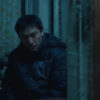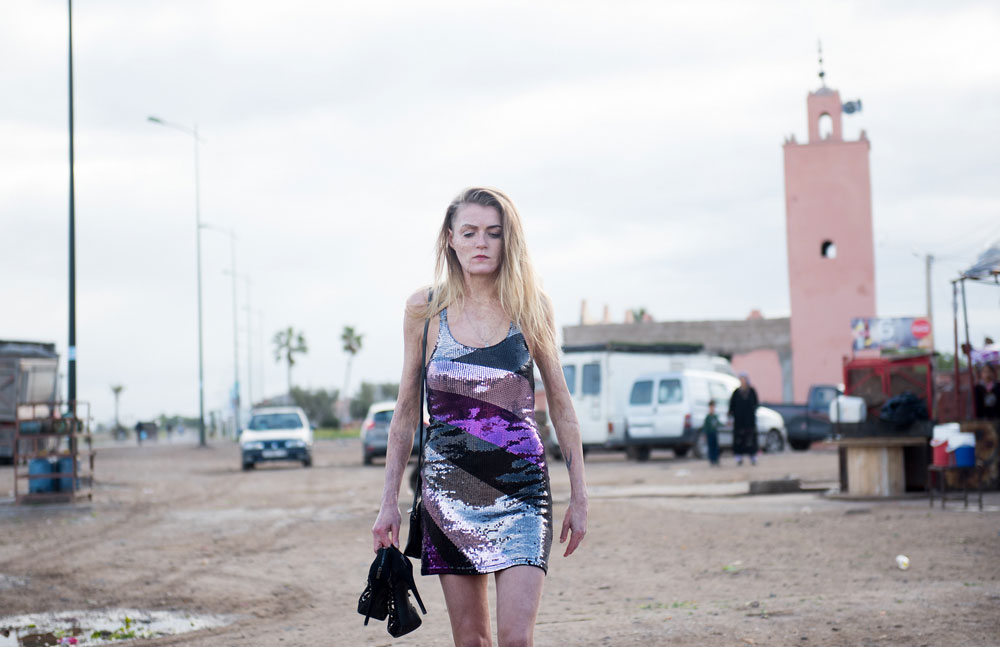When Jade (Vicky Knight) returns home in “Dirty God,” she’s discouraged to learn that the world may have moved on without her, with her mother Lisa (Katherine Kelly) able to take care of her baby girl Rae and her friend Shami (Rebecca Stone) heading back to the clubs they used to frequent together as if nothing’s changed, though one need only look at the right side of Jade’s face to see that something has. In Sacha Polak’s second feature, Jade is eager to get up to speed, yet as a survivor of a recent acid attack, she faces the nagging recognition that a return to the life she once had isn’t going to be easy, though what separates “Dirty God” from similar stories of living through such a traumatic incident is that no self-pity is going to hold her back.
Marking the screen debut of Knight, a real-life burn victim who becomes living proof that one can escape being defined by the pain in their past in refashioning herself into a captivating actress, “Dirty God” doesn’t linger on the day that Jade was violently attacked, but how she’ll spend all the days after living on two different timelines, thrusting herself into the present moment to put the incident behind her and regain a sense of self apart from her physical appearance while being reminded of the past seeing the expressions of others even if she gets comfortable with her self-image. Knight and Polak complicate matters in fascinating ways, bringing Jade back into a life that lacked direction before it all went sideways, forcing her into choices she was already reluctant to make now burdened with the additional weight of concern for how she appears. And while her youthful rebelliousness has built up an unexpectedly strong resistance to any potential insults, it also leads to irrational decisions that threaten an already precarious future.
Beyond Knight’s bold performance, Polak is constantly bringing out Jade’s emotions in the environments she’s in, using lights of every color to create images as vivid as what she’s feeling in any given moment and building small, revealing moments in with co-writer Susie Farrell to show disparity between how Jade sees herself and how she feels the rest of the world does. Following the film’s warm reception as the opening night film at Rotterdam, “Dirty God” made its North American premiere at Sundance where Knight and Polak spoke just before about how they came to collaborate, following Jade’s journey from England to Marrakech, and making a lively drama out of such harrowing material.
How did this film come about?
Sacha Polak: About five years ago, I saw a young woman with scars at a music festival, and I looked at her and I looked away, and I saw everybody doing the same thing, but then I thought, “I want to make a film about a young woman with scars.” I had heard about these acid attacks, violent attacks from men towards women, [like] “If you are not beautiful for me,” then you cannot be beautiful for anyone,” and that was the starting point for this film.
How did Vicky come onboard?
Sacha Polak: I found her through Lucy Pardee, a casting director who’s done most of Andrea Arnold’s films, and Vicky posted a video of herself online.
Vicky Knight: [It was about] how I got burnt as a child, and fortunately for me, it went viral on Facebook and YouTube, then I was approached by Lucy who kept messaging me for a whole year, asking me to meet up. At first, I said no because I had done a stupid program that basically tricked me into doing it that turned out to be a dating program with people with disabilities called “Too Ugly for Love.” I was completely humiliated on national TV, and when Lucy approached me to do this film, I said “no.” But she kept going on for a whole year and when finally I called her and we met up, she went through what their film was going to be about. I did a self tape, then Sacha came over to meet me and from there, we did about six months of [rehearsal] and auditions with other actors. We would act out some of the scenes in the film to see if it would work, and I got [to have] really close connections with the other actors.
Did the script change once Vicky was cast, knowing how her experience could inform the role?
Sacha Polak: For me, the script is a safety net, but then I really love to improvise. And Vicky brought so much to this film. There were things that I saw in her, like this small, smiley face tattoo on her middle finger, and I immediately thought, “Okay, we have to do something with this in the film,” so I thought of a scene where she does the same thing. There were many things like that, and working with a group of young, London actors, they helped me so much with the slang and things like that.
Vicky Knight: And I put a lot of my own experiences into the character. For example, when Jade goes to Marrakech and finds this clinic that’s going to fix her face, I actually did that when I as growing up. I e-mailed so many doctors around the world to see if they could get rid of my scars, and these doctors will do anything for money, so they were like, “Yeah, we can get rid of your scars.” And I was so gullible. I believed it so much [even] when people were saying to me, “Vick, it’s not going to work.” As I got older, I realized how stupid I was, so a lot of what Jade has been through, I have actually been through, too.
There’s a lot of evocative uses of light, particularly in a sequence when Jade and her friend goes through a car wash that really expresses her internal feelings. What was it like figuring out the look of this?
Sacha Polak: We wanted to show that these scars weren’t just physical but emotional and for me and Ruben Impens, who was the DP on this film, it was really important not to make a kitchen sink drama or a depressing film, but to make a hopeful film and colorful film that [expressed] youth culture and was from the perspective of Jade, so colors were important. Getting dreamy vibes was also important.
Vicky Knight: None of it’s written – it’s all the reality of living with scars and all the real emotions, and the reality of living with scars.
This covers so much ground from England to the Netherlands to Morocco. What was it was like jumping around from place to place?
Vicky Knight: Oh, I loved every second of it – being on set, going to London, to Amsterdam, to Morocco. It was absolutely incredible. there were a few things in Morocco that went a bit wrong – we had a crane that nearly crashed on me. [laughs] But apart from that, it was amazing experience.
What’s it been like to be at Rotterdam and Sundance this week?
Vicky Knight: Oh, I’ve loved every second of it. Absolutely amazing.
Sacha Polak: I can’t wait to show it to the Sundance audience. The opening of Rotterdam was mind-blowing with so many people watching it, and this is a really special film for me, so I really hope it will touch audiences.
“Dirty God” does not yet have U.S. distribution.




